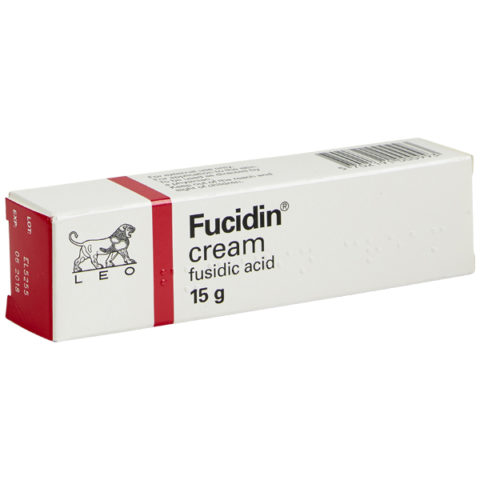Fucidin Cream
Price range: £10.99 through £17.99
Fucidin cream contains the active ingredient fusidic acid, which is an antibiotic used to treat infected areas on the skin caused by dermatitis or eczema. Fucidin cream treats infections within as little as seven to ten days.
| Options | Price | Stock |
|---|---|---|
| 1 x 15g Tube | £10.99 | Out of Stock |
| 1 x 30g Tube | £17.99 | Out of Stock |

Discreet Packaging

UK Based
-
What is Fucidin Cream used for?
Fucidin cream contains fusidic acid. It is a type of antibiotic that works by killing germs (bacteria) that cause's skin infections such as : • Impetigo (a weeping, crusty and swollen patch of skin) • Infected dermatitis and Eczema (inflammation of the skin) and spots • Infected cuts and grazes.What is Eczema?
Eczema mostly affects children. Here, the skin becomes itchy, red and dry. The most common area affected is the back and front of the knees.Although it can affect any part of the body. Flare ups occur when the condition becomes more acute. The cause is unknown. However, it has been linked to allergies. Eczema (also known as dermatitis) is a dry skin condition. It is a highly individual condition which varies from person to person and comes in many different forms. It is not contagious so you cannot catch it from someone else. In mild cases of eczema, the skin is dry, scaly, red and itchy. In more severe cases there may be weeping, crusting and bleeding. Constant scratching causes the skin to split and bleed and also leaves it open to infection. Eczema affects people of all ages but is primarily seen in children. Those who “grow out” of their eczema during early childhood may see it recur again in later life.How to treat Eczema using Fucidin Cream?
There is no cure for Eczema, However, use creams such as Fucidin Cream to control the symptoms and reduce inflammation and clears the infection. For some people with eczema, the regular use of emollients is all that is needed to keep the condition under control. However, for many people there will be a time when a steroid preparation is required as part of their treatment in order to bring an eczema flare under control. Topical steroids and anti-bacterial creams are the most common treatment for eczema flares. This is when eczema becomes red, sore and very itchy.How to Apply Fucidin Cream?
This medicine is only for using on your skin. Do not swallow it. Do not put it inside your body. Remove the cap. Check the seal is not broken before you first use the cream. Then push the spike in the cap through the seal on the tube. Always wash your hands before using Fucidin cream. Rub the medicine gently on the skin. If you use it on your face be careful to avoid your eyes. Unless you are using the cream to treat your hands, always wash your hands after using Fucidin cream. If you accidentally get any medicine in your eye, wash it out with cold water straight away. Then bathe your eye with eyewash if possible. Your eye may sting. If you start to have any problems with your sight or your eye is sore, contact your doctor immediately.How much Fucidin cream to use
Usually, you should use this medicine three or four times each day. If you have been told to cover the skin with any dressings or bandages you may not need to use the medicine so often. A nappy on a baby may act as a dressing. Follow the advice of your doctor. see more information on Eczema and other treatments. -
Side Effects
Possible side effects
Like all medicines, this medicine can cause side effects, although not everybody gets them.
Important side effects to look out for:
Rare (may affect up to 1 in 1,000 people)
You must get urgent medical help if you have any of the following symptoms.
You may be having an allergic reaction:
• You have difficulty breathing
• Your face or throat swell
• Your skin develops a severe rash.
Other possible side effects:
Uncommon side effects (may affect up to 1 in
100 people)
• Irritation at site of application (including pain,
burning, irritation, stinging and skin redness)
• Itching
• Rash
• Eczema.
Rare side effects (may affect up to 1 in 1,000 people)
• Conjunctivitis
• Hives
• Skin swelling
• Blistering of the skin -
Further Information













